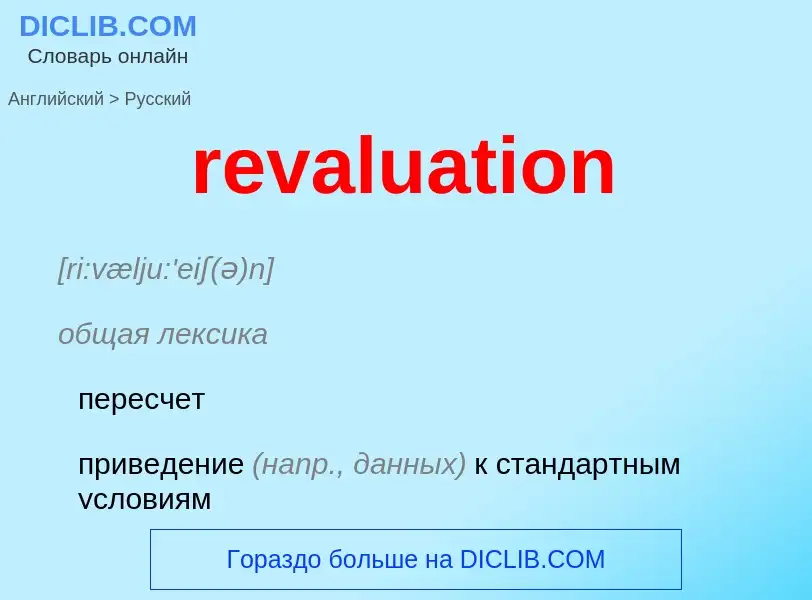Traduzione e analisi delle parole tramite l'intelligenza artificiale ChatGPT
In questa pagina puoi ottenere un'analisi dettagliata di una parola o frase, prodotta utilizzando la migliore tecnologia di intelligenza artificiale fino ad oggi:
- come viene usata la parola
- frequenza di utilizzo
- è usato più spesso nel discorso orale o scritto
- opzioni di traduzione delle parole
- esempi di utilizzo (varie frasi con traduzione)
- etimologia
revaluation - traduzione in russo
[ri:vælju:'eiʃ(ə)n]
общая лексика
пересчет
приведение (напр., данных) к стандартным условиям
существительное
общая лексика
пересчёт
экономика
ревальвация (административное повышение ранее установленной стоимости валюты как промежуточная цель экономической политики (напр., в целях сдерживания совокупного спроса в экономической системе))
повышение курса валюты (на свободном рынке)
бухгалтерский учет
переоценка
пересчет
повторная оценка (стоимости активов (напр., оборудования, ценных бумаг) или обязательств (напр., долгов); определение их стоимости на настоящий момент времени, т. е. текущей рыночной стоимости)
Wikipedia
Revaluation is a change in a price of a good or product, or especially of a currency, in which case it is specifically an official rise of the value of the currency in relation to a foreign currency in a fixed exchange rate system. In contrast, a devaluation is an official reduction in the value of the currency. Under floating exchange rates, a rise in a currency's value is an appreciation. Altering the face value of a currency without changing its purchasing power is a redenomination, not a revaluation (this is typically accomplished by issuing a new currency with a different, usually lower, face value and a different, usually higher, exchange rate while leaving the old currency unchanged; then the new replaces the old).
In a fixed exchange rate system, the central bank maintains an officially announced exchange rate by standing ready to buy or sell foreign currency at that rate. In general terms, revaluation of a currency is a calculated adjustment to a country's official exchange rate relative to a chosen baseline. The baseline could in principle be anything from wage rates to the price of gold to a foreign currency. In a fixed exchange rate regime, only a decision by a country's government (specifically, its central bank) can alter the official value of the currency.
For example, suppose a government has set 10 units of its currency equal to one US dollar. To revalue, the government might change the rate to 9.9 units per dollar. This would result in that currency being slightly more expensive to people buying that currency with U.S. dollars than previously and the US dollar costing slightly less to those buying it with foreign currency.

